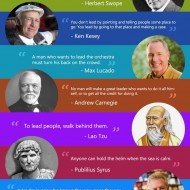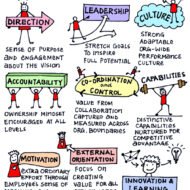Posted by Managementguru in Leadership, Quotes and Quotes Only
on Jul 31st, 2015 | 0 comments

All-time Quotes by Abdul Kalam The crux of his life in his very own words: “My story—the story of the son of Jainulabdeen, who lived for over a hundred years on Mosque Street in Rameswaram island and died there; the story of a lad who sold newspapers to help his brother; The story of a pupil reared by Sivasubramania Iyer and Iyadurai Solomon; the story of a student taught by teachers like Pandalai; the story of an engineer spotted by MGK Menon and groomed by the legendary Prof. Sarabhai; The story of a scientist tested by failures and setbacks; the story of a leader supported by a large team of brilliant and dedicated professionals. This story will end with me, for I have no belongings in the worldly sense. I have acquired nothing, built nothing, possess nothing—no family, sons, daughters.” Some very unique and inspiring quotes by the great man: 1. “All birds find shelter during a rain . But Eagles avoid rain by flying above the clouds. Problems are common ,but attitude make the difference . 2. “Let me define a leader. He must have vision and passion and not be afraid of any problem. Instead, he should know how to defeat it. Most importantly, he must work with integrity. 3. “Anyone who converts a challenge into an opportunity through innovation creates wealth. He or she indeed is a leader, are you? 4. “Yesterday leaders commanded the control (yesterday they were commanders, the leaders). Today, leaders empower and coach, that means potential leaders will be empowered to the exposure of needs of sustainable development, what we need today. 5. “For success in all missions, it is essential to have creative leaders in our country or anywhere else. Creative leadership means exercising the vision to change the traditional role from the commander to the coach. 6. “What is Success? When your signature changes to ‘Autograph’. 7. “Take risks in your life. If you win, you can lead! If you lose, you can guide! 8. “Man needs difficulties because they are necessary to enjoy success. 9. “Don’t read success stories you will get only messages, read failure stories you will get some ideas to get success. 10. “Dreams are not what you see in your sleep, dreams are what which doesn’t let you sleep. 11. “You have to dream before your dreams can come true. 12. “To succeed in your mission, you must have single-minded devotion to your goal. Also “If you get No as an answer, remember N.O. means “Next Opportunity”. So Let’s be positive. 13. “If you salute your duty, you have no need to salute anybody, But- If you pollute your duty, you have to salute everybody. 14. “I am not a handsome guy, But ‘ I can give my hand-to-some one who needs help. Beauty is in the heart Not in the face. 15. “Never rest after your first victory, because many lips are waiting to say that your first victory was just luck. 16. “If a country is to be corruption free and become a nation of beautiful minds, I strongly feel there are three key societal members who can make a difference. They are the father, the mother and the teacher. 17. “It is very easy to defeat someone, but it is very hard to win someone. 18. “Suffering is the essence of success. 19. “Dream, Dream Dream Dreams transform into thoughts And thoughts result in action. 20. “My message, especially to young people is to have courage to think differently, courage to invent, to travel the unexplored path, courage to discover the impossible and to conquer the problems and succeed. These are great qualities that they must work...

Posted by Managementguru in Decision Making, Entrepreneurship, Human Resource, Leadership
on Apr 21st, 2015 | 0 comments

Top Ten Tips for First Time Managers Everybody wants to become a leader. You may vie for it, I might die for it; but in reality not everybody can make a good leader. Leadership does seek persons who are unique in their own way. One unique element which I’ve noticed in managers or leaders is that when they enter the work place, they bring along with them a kind of aura that has the power to make others submissive and polite. Not to say they are over-powering but definitely the sub-ordinates would love to greet their heads with such vigor so as to be in their good books combined with a sense of loyalty laced with respect. This session talks about “First Time Managers” who have reached the position by chance or choice and the etiquettes needed to be bestowed upon that position. 1. Learning is Eternal: “கற்றது கைமண் அளவு, கல்லாதது உலகளவு –This quote by the famous Tamil lady poet Avvaiyar who lived in 13th century reminds you “What you have learned is a mere handful; what you haven’t learned is the size of the world” and exhibited at NASA. It can also be written as “Known is a drop, unknown is an Ocean.” See how appropriate she is in indicating the finer points in our lives- just because you are a team leader or a manager does not mean that you are near perfect. You may be lacking the self-confidence to lead a team or you might be falling short in communicating clearly with the team down the line. It is always better to play along with the team, understand their psychology and at the same time exercise your rights at the right spots. You will stand to gain so much by being flexible and empathetic. 2. Communication is the Key: Here I want to take the help of the ManagementGuru Peter Drucker who prescribed the medicine for better management which is “Management by Objectives.” Keep your team fully informed of project goals, priorities, and all-important deadlines and also involve them to set short term goals. A periodical review of the goals and results would put them in place and make your work easy. Effective communication makes you trust worthy in the eyes of your team, also provides clear direction and a sense of belongingness. 3. Inspire your Team: Passion is one element that is infectious and the other being smile. If you are passionate and sincere in your work, the enthusiasm flows like honey on ice-cream all over the workplace. A good manager creates that “Feel-Good-Factor’ whenever he is around. It is his confidence, emotional stability, communication and determination that gets carried on facilitating effective accomplishment of the enterprise goals. An infographic from AN ETHICAL ISLAND– A great guide for leaders and managers… 4. Be a Friend: Efficient managers understand the pulse of work-force just from their body language and communicating styles. It becomes difficult sometimes to read between the lines when employees are hard nuts to crack and would not explicitly convey or talk about important issues that are bothering them. This may be due to fear, anxiety or peer pressure. These are the times when a manager has to behave like a friend in listening to them patiently to understand the crux of the problem so as to find a suitable solution. 5. Spontaneous appreciation and Mild Criticism: Think about the happiness you derive when somebody appreciates you for a good effort or achievement. The same applies to your team also, right! Appreciation for the sake of appreciating will fetch you only negative results, it has to be spontaneous. Even a mild nod of approval, a...

Posted by Managementguru in Business Management, Change management, Human Resource, Organisational behaviour
on Jul 25th, 2014 | 0 comments

EQ or EI When we talk about IQ or Intelligence Quotient, another entity which is indispensable to the smooth running of your business comes into the picture. Yes, I’m talking about Emotional Quotient or EQ, also called as Emotional Intelligence or EI. The concept of emotional intelligence is a blanket term that covers a broad collection of individual skills and dispositions, usually referred to as soft skills or inter and intra-personal skills. One must be adept at handling situations which warrant application of EI and at the same time strong in his/her basic IQ. Answer these simple questions and please don’t think way too extensively. Simple thinking will do… 1. How do you put a giraffe into a refrigerator? The correct answer is: Open the refrigerator put in the giraffe and close the door. This question tests whether you tend to do simple things in an overly complicated way. 2. How do you put an elephant into a refrigerator? The wrong answer is: Open the refrigerator put in the elephant and close the door. The correct answer is: Open the refrigerator, take out the giraffe, put in the elephant and close the door. This tests your ability to think through the repercussions of your actions. 3. The Lion King is hosting an animal conference; all the animals attend except one. Which animal does not attend? The correct answer is: The Elephant. The Elephant is in the refrigerator. This tests your memory. OK, even if you did not answer the first three questions, correctly, you still have one more opportunity to show your abilities. 4. There is a broad, deep river you must cross. But it is inhabited by hungry crocodiles. How do you manage it? The correct answer is: You swim across. All the Crocodiles are attending the Animal Meeting! This tests whether you learn quickly from your mistakes. This EXERCISE is cited just to show that logic or reasoning is an important element in management; at workplace or home. Parallel Thinking Just that you have to prune your memory to enhance your parallel thinking. In general parallel thinking is a further development of the well-known lateral thinking processes, focusing even more on probabilities—looking for what can be rather than for what is. Be Mindful of Others’ emotions: Emotional intelligence can be defined as the ability to monitor one’s own and other people’s emotions, to discriminate between different emotions and label them appropriately and to use emotional information to guide thinking and behavior. Emotional intelligence involves being MINDFUL of emotions and how they can affect and interact with traditional intelligence (e.g., impair or enhance judgment, etc.). One must also be able to develop and maintain healthy interpersonal relationships apart from being intelligent. It involves a lot of psychology which is in-built in our mechanism and heightened by our exposure to various work situations and challenges. An examination of more than 300 top-level executives from fifteen global companies showed that six emotional competencies distinguished stars from the average. Influence Team leadership Organizational Awareness Self-confidence Achievement Drive and Leadership Using Emotional Intelligence on the Job Emotional awareness is being in touch with the feelings of others. Well, if you say that “Emotions don’t go well with Logic”, and “Emotions can’t be mixed with Business”, I’d like to remind you “A controlled mind and cheerful spirit” are crucial when it comes to employee engagement and sustaining their morale. Even though your employees are well trained and technically experts in their own area, it takes that extra something for them to work whole-heartedly for their principals. They have to identify themselves with the organization and its objectives, in particular with the key persons...

Posted by Managementguru in Human Resource, Quotes and Quotes Only, Training & Development
on Jul 6th, 2014 | 0 comments

Popular HR Quotes by Industry Experts and Management Scholars We have compiled 50 top notch hr quotes from doyens in the field of business and management that will sure fire inspire you with creative ideas. 1. “Great Vision Without Great People Is Irrelevant.” -Jim Collins, Good To Great 2. “Human Resources Isn’t A Thing We Do. It’s The Thing That Runs Our Business.” -Steve Wynn, Wynn Las Vegas 3. “You Need To Have A Collaborative Hiring Process.” -Steve Jobs, Apple 4. “You Can’t Teach Employees To Smile. They Have To Smile Before You Hire Them.” -Arte Nathan, Wynn Las Vegas 5. “Never Hire Someone Who Knows Less Than You Do About What He’s Hired To Do.” -Malcolm Forbes, Forbes Top 50 HR Quotes 6. “When Hiring Key Employees, There Are Only Two Qualities To Look For: Judgement And Taste. Almost Everything Else Can Be Bought By The Yard.” John W. Gardner 7. “Recently, I Was Asked If I Was Going To Fire An Employee Who Made A Mistake That Cost The Company $600,000. No, I Replied, I Just Spent $600,000 Training Him. Why Would I Want Somebody To Hire His Experience?” -Thomas John Watson Sr., Ibm 8. “It’s More Than Just Selling Pizzas. It’s Being A Good Fit For The Community. We Hire Based On The Betterment Of The Community As Much As Anything.” -Mark Starr, David’s Pizza. 9. “You Can Have The Best Strategy And The Best Building In The World, But If You Don’t Have The Hearts And Minds Of The People Who Work With You, None Of It Comes To Life.” -Renee West, Luxor And Excalibur Hotel 10. “I am convinced that nothing we do is more important than hiring and developing people. At the end of the day you bet on people, not on strategies.” -Lawrence Bossidy, Ge CURRENT TRENDS IN HRD 11. “Do Not Hire A Man Who Does Your Work For Money, But Him Who Does It For The Love Of It.” -Henry David Thoreau, Life Without Principle 12. “If You Think Hiring Professionals Is Expensive, Try Hiring Amateurs” -Anonymous 13. “The Key For Us, Number One, Has Always Been Hiring Very Smart People.” -Bill Gates, Microsoft 14. “Time Spent On Hiring Is Time Well Spent.” -Robert Half 15. “I Hire People Brighter Than Me And Then I Get Out Of Their Way” -Lee Iacocca, Ford 16. “You Cannot Push Anyone Up The Ladder Unless He Is Willing To Climb.” -Andrew Carnegie 17. “Management Is Nothing More Than Motivating Other People.” -Lee Iacocca, Ford 18. “There Are Few, If Any, Jobs In Which Ability Alone Is Sufficient. Needed, Also, Are Loyalty, Sincerity, Enthusiasm And Team Play.” -William B. Given, Jr. 19. “When People Go To Work, They Shouldn’t Have To Leave Their Hearts At Home.” -Betty Bender 20. “One Machine Can Do The Work Of Fifty Ordinary Men. No Machine Can Do The Work Of One Extraordinary Man.” -Elbert Hubbard 21. “To Find Joy In Work Is To Discover The Fountain Of Youth.” -Pearl S. Buck 22. “One Of The Symptoms Of An Approaching Nervous Breakdown Is The Belief That One’s Work Is Terribly Important.” -Bertrand Russell 23. “Opportunity Is Missed By Most People Because It Is Dressed In Overalls And Looks Like Work.” -Thomas A. Edison 24. “Far And Away The Best Prize That Life Offers Is The Chance To Work Hard At Work Worth Doing.” -Theodore Roosevelt 25. ”Being Busy Does Not Always Mean Real Work. The Object Of All Work Is Production Or Accomplishment And To Either Of These Ends There Must Be Forethought, System, Planning, Intelligence, And Honest Purpose, As Well As Perspiration. Seeming To Do Is Not Doing.” -Thomas A. Edison 26. “Going To Work For A Large Company Is Like...

Posted by Managementguru in Change management, Human Resource, Organisational behaviour
on May 20th, 2014 | 0 comments

Organizational Climate – An Analogy Organizational climate is a measure of the feel of the internal environment of an organization which is perceived by an outsider and/or an employee according to their business with the organization. Organizational climate has a great effect on employees’ behavior. If the climate of an organization is open and friendly, employees feel relaxed and if it is very formal, then such a comfort level may not be felt. Climate for an organization is somewhat like personality for a person. “Just as every individual has a personality that makes him/her unique, an organization has a climate that clearly distinguishes its personality from other organizations. Human religionists introduced the concept of organizational climate in the late 1940’s. Now this has become a very useful metaphor for thinking about and describing the social aspects of a firm. Some definitions: “A set of characteristics that describe an organization and that i. Distinguish one organization from another ii. Are relatively enduring over a period of time and iii. Influence the behavior of people in the organization.” – Forehand and Gilmber “A mutually agreed internal (or molar) environmental description of an organization’s practices and procedures.” – Benjamin Schneider (1975) “A relatively ending quality of the internal environment that is experienced by the members, which influences their behavior and can describe in terms of values of a particular set of characteristics of the organization.” – Renato Tagiuri (1968) Features: It is an abstract and intangible concept. But it exercises a significant impact on the behavior and performance of organization members. It is the perceived aspect of organization’s internal environment. It refers to the relatively enduring characteristics which remain stable over a period of time. It gives a distinct identity to organization and differentiates it from others. It is a total expression of what the organization is. It is the summary perception which people have about organizations. It is a multi-dimensional concept. It consists of all organizational factors – authority pattern, leadership pattern, communication pattern, control etc. Elements of Organizational Climate: Individual Autonomy: The extent to which employees are entrusted with to make decisions, the degree to which they are free to manage themselves and have the freedom to exercise their responsibility come under the purview of individual autonomy. Position Structure: It means the extent of direct supervision, formalization and centralization in an organization. Reward Orientation: The degree to which an organization rewards individuals for hard work or achievement. It will be high when an organization orients people to perform better and rewards them for doing so. Task Orientation: If the outlook of the top management is task oriented, the employees will have to speed up the pace of work to please their bosses. Relations Orientation or Consideration: Here the climate is conducive and supportive where the managers are relations-oriented while dealing with their sub-ordinates. The needs and aspirations of the workers will be given due importance resulting in enhanced team spirit. Job Satisfaction: The workers feel happy if the jobs are designed to allow the worker to use their innovative skills. Morale: Morale represents a composite of feelings, attitude and sentiments of organizational members towards the organization, superiors and fellow workers. If it is high, there will be an atmosphere of co-operation and if it is low, there will be conflicts and poor co-operation among the workers. They will also feel dis-oriented in their work. Control: The control systems may be either rigid or flexible. An impersonal or bureaucratic atmosphere is seen in the former situation where the scope of self-regulation will be minimum. DOWNLOAD THE PDF...










